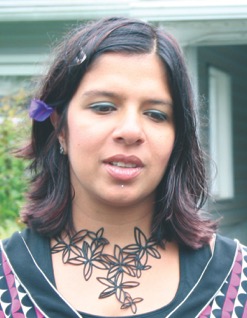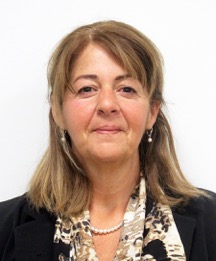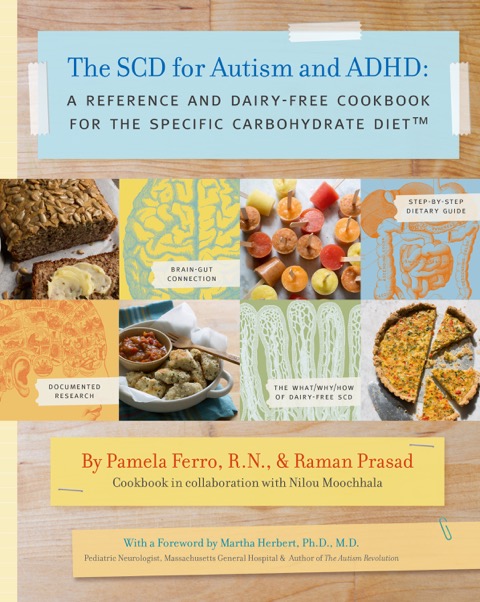Contribute
| In Conversation With Raman Prasad & Niloufer Moochhala |
Nirmala Garimella
05/21/2015
Raman Prasad is the founder of scdrecipe.com, a well-established online SCD resource. He is the author of the SCD cookbooks Recipes for the Specific Carbohydrate Diet(Fair Winds Press, 2008) and Adventures in the Family Kitchen (2005), as well as the non-fiction memoir Colitis & Me (2003). Nilou Moochhala is the co-author of Recipes for the Specific Carbohydrate Diet, and assisted in Prasad’s Adventures in the Family Kitchen. She has designed and tested the SCD-DF recipes for the Cookbook section of this book. Pamela Ferro is a co-founder of Hopewell Associates, a nurse-run practice in southern Massachusetts. Over the past decade, Pam has treated children and adults with autism and ADHD implementing the SCD-DF. The SCD diet that you refer in this book - ? What exactly does that it mean? The SCD, or "Specific Carbohydrate Diet", is nearly 100 years old. It was created by Dr. Sidney Valentine Haas, a New York City-based pediatrician. On the SCD, most, but not all, complex carbohydrates including bread, rice, and potatoes are eliminated i.e. the SCD includes "specific" carbohydrates. Starting in the 1920s, the SCD became widely used for celiac disease. Prior to that time, many children literally wasted away from the disease. However, use of the SCD waned after World War II, when it was found that simply eliminating gluten helped most celiac sufferers. Staring in the 1990s, the late Canadian author Elaine Gottschall revived the diet through her book Breaking the Vicious Cycle. Up until this time, the diet's main use has been for Crohn's disease, ulcerative colitis, and IBS. It is also quite effective for celiac disease when simply eliminating gluten doesn't work. Research at institutions including Seattle Children's Hospital, Rush Medical Center, and Stanford University has shown that the diet changes the composition of bacteria in the intestine (part of the microbiome) and helps reduce and even eliminate symptoms of those diseases. Most recently, several healthcare practitioners have been using a dairy-free version of the diet for autism spectrum disorder (ASD) as well as ADHD. This book on the Using the SCD for Autism and ADHD is based on Pam Ferro's 10+ years of clinical experience using the diet. The positive patient outcomes have caught the eye of researchers and there is a now pilot study in peer review. How did we come upon this dietary protocol? Back in 1994, I (Raman Prasad) was struggling through college and my sixth year with severe ulcerative colitis. At best, eating led to bloating and low levels of pain. This was punctuated by periods of bloody diarrhea and severe stomach cramping, alleviated only by heavy doses of steroids. Over time, the disease and treatments began to take their toll. In the months that followed, fueled by prednisone and desperation, I decided to try the Specific Carbohydrate Diet (SCD)™. Finally, after several months on the SCD, my digestion normalized for the first time in years. Three years later, I was happily married (to my co-author Nilou Moochhala) and living in Brooklyn, and keeping up with the diet as well as a demanding job at a dot.com startup in New York City. I have now followed the Specific Carbohydrate Diet (SCD)™ successfully for more than 18 years, which has resulted in a return to good health and a normal life. In 1998, inspired by my recovery and remission from ulcerative colitis, I founded scdrecipe.com, which includes hundreds of SCD recipes, news items, and other relevant information about this dietary protocol. I have also authored the non-fiction memoir Colitis & Me: A Story of Recovery, that chronicles my life with crippling ulcerative colitis from ages 17 to 24, and how I ultimately restored health through the SCD. Additionally, I have written two cookbooks: Recipes for the Specific Carbohydrate Diet (Fair Winds Press, 2008), which contains a global repertoire of gluten-free and dairy-free SCD-inspired culinary delights, and Adventures in the Family Kitchen (2005), which combines traditional Italian-American and Indian family recipes. What was the purpose of the launch? Who should read it? If a person with autism or ADHD suffers from digestive issues, then the parents or caregivers should definitely read this book. When given a diagnosis such as autism, issues such as minor diarrhea or constipation, irritable bowel, reflux, or even Crohn's disease may seem unrelated or secondary. However, these digestive issues have a strong impact on dozens of behaviors ranging from being withdrawn or anxious to sensory disorders and even self-harm. In one case a 34-year old man diagnosed with ASD as a child had been banging his head against the wall and gnawing holes in the chest area of his shirts for decades. When the staff at the group home where he lives implemented the SCD, this behavior stopped within weeks. Simply stopped. He has ASD but the quality of his life and those around him has changed--he can be happy. A core idea of the book is that focusing on digestion leads to improved health and behavior. For younger children on the diet, parents find that behavior becomes predictable and there are (often dramatic) improvements in mood, cognition, and even language. One study showed that the stress levels (cortisol profiles) of moms caring for children with autism resemble that of combat veterans and PTSD sufferers. For these moms, and other caregivers, predictable behavior can literally be life changing for a family. That said, starting a new diet for people known to be the pickiest of the picky eaters is challenging. The book is divided into two main sections: a reference or practical guide to get started as well as a recipe book with menu plans. A key section of the book talks about organizing, including building a support group of friends and family, before starting the diet. In addition, you must consult with your healthcare practitioner. (One caveat: We are saying that diet provides a method or an important tool for improving and managing symptoms of autism and ADHD. However, to be clear, diet certainly does not cause autism or ADHD.) How many years of research has gone in this book? Do you have any statistics of South Asians affected by Autism? I have known my co-author Pamela Ferro for over a decade - initially meeting her through Elaine Gottschall at a Defeat Autism Now conference. Starting back in 2006, I visited Pam's clinic and met with her patients. Hearing their striking success stories made a lasting impact on me. Back then it seemed to be a only a matter of time before dietary interventions would be quickly adapted or at least researched. The motivation to start the book came from a desire to reach out to more people. (Pam's son was diagnosed with autism as a toddler and starting using the SCD in his teenage years.) We have been working on the book over a 3-4 year period. We started with my co-author’s Pam’s clinical experience but also delved into medical journals and research articles to give a broader understanding to what is going on inside the body of someone with autism or ADHD. There are more than 200 citations and for each of those we probably read another 3 to 5 articles that were not cited. An exciting part of the foundation of this book - that pathogenic intestinal bacteria is intimately involved in disease processes AND that diet can change the composition of intestinal bacteria - are now seen as fact. Indeed, during our work on this book, a pilot study was implemented at the Johnson Center for Child Health and Development in Austin using the Specific Carbohydrate Diet for children with autism. The results will be published/released sometime this year. Within the US, the CDC notes that autism cuts across all racial, ethnic, and economic groups, and that the current rate of autism is 1 in 68 children. For South Asia, and India specifically, autism was not even recognized as a disorder till 2001, and according to the Times of India (2013) the rate is 1 in 250, but this might be even more so today. Can you share with the readers some specific tips from the book? Parents dealing with autism struggle to expand their children's diets, which mostly consist of "white", bland foods (think French Fries, chicken nuggets, etc). Many parents have tried "special diets" and consulted with eating specialists who use appetite stimulants and behavioral interventions--all to no avail. When told to try the SCD, parents slowly shake their heads when looking at the food list. However, once children are switched to SCD and initial resistance gives way, the children thrive. For example, here is the diet of a four-year-old child with ASD who struggled with reflux from infancy: crackers, French Fries, pediatric nutrition shakes loaded with sugars and additives, salami, and toast. That was the entire scope of her diet. A year into the SCD, her mom's food diary had an entry with scrambled eggs, green beans, meat loaf, zucchini meatballs, spinach, peas, and rutabagas -- that was for a single day. In the first three weeks on the dairy-free SCD, the same girl went off of reflux medication and in two months started speaking in sentences and reduced her hand flapping. She glows with health while early pictures show unusually pale skin and dark circles under her eyes. Parents should approach using the SCD with patience, optimism, and the idea that change is possible. There is a chapter on the Gut Microbiome on behaviour? Elaborate? It is important to have a basic understanding of WHY to use the diet. However, reading science about the gut microbiome can quickly become complex. To explain key concepts, we used the metaphors of a Bubbling Cauldron, an Attack on Castle Walls, and a Movie Theater. For instance, in the case of the Bubbling Cauldron, we write about how when food isn't being digested properly, it leads to the growth of harmful gut bacteria as well as the production of gas (think foul wind, bloated bellies) and harmful acids. This is captured with the image of a cauldron -- bubbling and churning as undigested food causes pain and discomfort in the abdomen. For a child who may be nonverbal or unable to communicate his/her feelings, this abdominal pain may present itself as agitation, screaming, stimming, crying, wincing, constant eating or drinking, pressing his/her abdomen, unusual posturing, and even aggression or self-injury. All of the studies that we read leading up to publication showed that children with autism have abnormal intestinal bacteria -- or the presence of this Bubbling Cauldron. In the book, the metaphors are expanded, showing how a Bubbling Cauldron can hinder the absorption of key vitamins and minerals and the impact that can have. By including diagrams and patient stories, we attempted to strike a balance between making concepts understandable for a lay reader while giving enough information (and references) for those more familiar with the science to delve deeper. Bottom line: If a person with autism or ADHD is struggling with behavioral issues, check the gut first. Finally, where can one find the book? The book “The SCD for Autism and ADHD: A Reference and Dairy-free Cookbook for the Specific Carbohydrate Diet™†is available currently on Amazon.com. The publisher is working on establishing a relationship with a book distributor to get it into brick-and-mortar shops such as larger chain bookstores and smaller local independent bookstores. Book info: The SCD for Autism and ADHD: A Reference and Dairy-free Cookbook for the Specific Carbohydrate Diet™ By Pamela Ferro, R.N., & Raman Prasad, Cookbook in collaboration with Nilou Moochhala With a Foreword by Martha Herbert, PhD, MD, Pediatric Neurologist, Massachusetts General Hospital & Author of The Autism Revolution Published By Swallowtail Press, Spring 2015 Paperback, 444 pages ISBN-13: 978-0-692-28005-8 Publisher: Swallowtail Press Price: $37.95 More info on book you can visit scdrecipe.com/autism.
You may also access this article through our web-site http://www.lokvani.com/

Raman Prasad

Nilou Moochhala

Pamela Ferro
